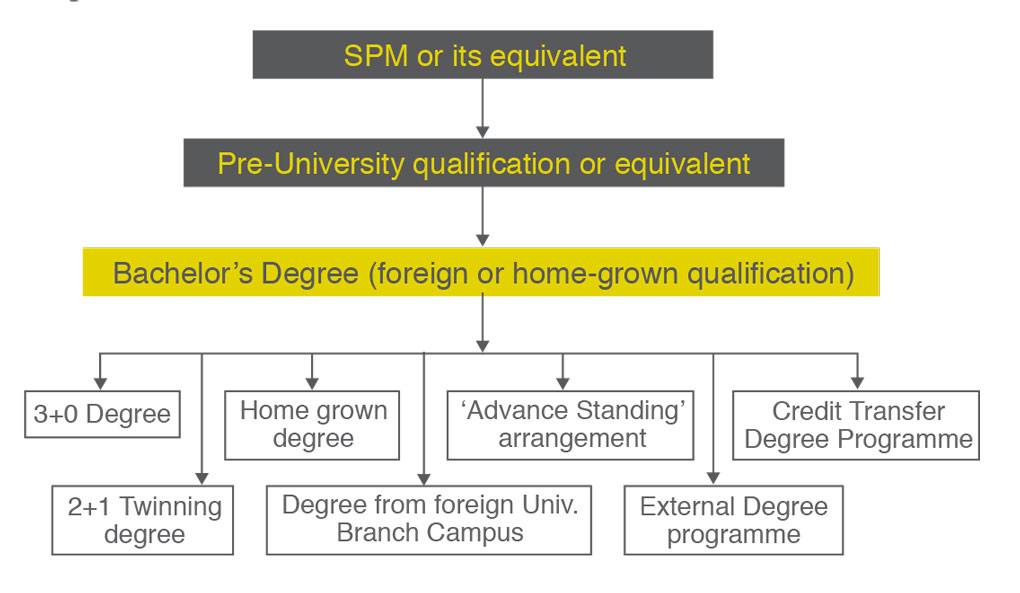Discovering study modes for a bachelor degree (home-grown and foreign degree)
by StudyMalaysia.com on December 21, 2020 | Top Stories, Higher Education in Malaysia

Both public and private higher educational institutions offer bachelor degree programmes to students. The entry requirement for a bachelor degree is a pre-university qualification or a recognised diploma, or its equivalent.
Private higher education institutions (PHEIs) provide a wide spectrum of study modes for students to pursue both local and foreign university degree qualifications that are affordable.
The modes of acquiring a bachelor degree at PHEIs in Malaysia include:
Acquiring Malaysian home-grown degree qualifications via:
- Internal qualifications: Malaysian home-grown private universities and university colleges that award homegrown degree qualifications
- Joint degree and dual-award undergraduate degree qualifications via home-grown degree qualifications: Some Malaysian universities collaborate with partner foreign universities to award joint degree qualifications and dual-award undergraduate degree certification to its graduates. A dual-award degree means that students graduate with two degrees, one from each university.
Acquiring foreign degree qualifications via:
- Courses offered by foreign university branch campuses located in Malaysia that lead to the award of the foreign university’s degree qualifications
- Courses conducted by Malaysian PHEIs that lead to foreign degree qualifications:
- Private colleges that offer twinning degree programmes (such as 2+1 and 3+0 arrangements) that lead to foreign degree qualifications awarded by universities from various countries
- Private colleges or private universities that offer credit transfer programmes (such as the American degree programme, or UK and Australia credit transfer programmes) that lead to foreign degree qualifications awarded by universities from various countries
- Private colleges that offer external degree programmes that lead to the award of a bachelor degree from foreign universities
Acquiring a foreign degree qualification via the ‘Advanced Standing’ pathway:
- Foreign degree qualification via a diploma pathway (vertical credit transfer)
- Foreign degree qualification via a degree pathway (horizontal credit transfer)
A home-grown diploma or bachelor degree with ‘advanced standing’ status means that these qualifications are recognised by foreign universities for credit transfer for their bachelor degree programmes.
Acquiring a bachelor degree via the distance learning mode
- Some universities in Malaysia offer the distance learning mode for students to acquire a bachelor degree qualification without having to be physically present at the campus.
Diagram 4.5 (1): Various study modes that lead to a bachelor degree
Study modes explained
'2+1' Twinning Degree Programmes that lead to a foreign university degree
Twinning degree programmes are one of the types of transnational education (TNE) but what it really means for you as a student is that you can study part of your bachelor degree here in Malaysia and the rest at the partner university abroad. This arrangement came about when Malaysian private higher education institutions (HEIs) collaborated with reputable universities from the United Kingdom, the United States, New Zealand and Australia. The result is a ‘2+1’ or ‘1+2’ twinning degree arrangement that leads to the award of a foreign degree qualification
Some outstanding features of this programme are:
- You register as a student with both the Malaysian private college and the foreign university, and when you complete the local segment successfully, you are guaranteed admission to the next level at the campus of the twinning university
- Depending on the programme you choose, twinning can be on a ‘1+2’ arrangement (1 year at the local private college and 2 years at the overseas twinning university) or ‘2+2’ or ‘2+1’
- You will study the same course curriculum as the students at the twinning university although in some cases, some local content of the subject is introduced to meet the local authority’s requirements
- The degree is awarded by the twinning university abroad. Local private colleges are not allowed to confer degrees for the twinning programme
3+0’ degree programmes that lead to a foreign university degree
The ‘3+0’ programme is an extension of the ‘2+1’ twinning programme that allows you to complete the entire foreign degree programme at a private HEI in Malaysia. Like the ‘2+1’ programme, you will study the same syllabus and obtain the same qualifications as students at the host university overseas. You will also go through the same method of assessment. In some instances, students can opt to complete their studies at the overseas host university.
This is definitely a more economical option because the course fees and the living expenses for the entire duration of the course are paid in Malaysian Ringgit.
Foreign university degree qualifications from foreign universities located in Malaysia
Currently, there are nine reputable foreign university branch campuses in Malaysia which offer foundation, undergraduate and postgraduate studies. The courses offered at the branch campuses here are identical to that of the host university overseas.
The first branch campus that was set up in Malaysia was Monash University, Australia in 1998. This was followed by Curtin University Sarawak Campus; The University of Nottingham Malaysia Campus; and Swinburne University of Technology Sarawak Campus. The fifth was Newcastle University Medicine Malaysia which was established in 2009 - the first university to be built within EduCity of the Iskandar Development Region (Iskandar Malaysia), Johor. After that, University of Southampton Malaysia Campus and Heriot-Watt University Malaysia were established, followed by University of Reading Malaysia campus in 2013. In 2015, Xiamen University of China set up its first overseas branch campus in Malaysia.
When you complete your studies at one of these universities in Malaysia, you will be awarded the same qualifications as students studying at the main campus abroad. Besides the lower cost of living in Malaysia, you will also pay lower tuition fees at the branch campus in Malaysia. In addition, you will have the opportunity to study abroad* for one or more semesters at the main campus overseas and need to pay only the fees of the Malaysian branch campus.
(Note: *This arrangement is not for all students and is subject to the student obtaining the appropriate visa from the relevant government and fulfilling other academic requirements of the university concerned.)
American Degree Transfer Programs (ADP) that lead to the award of a foreign university degree
American Degree Transfer Programs started in Malaysia in the mid-1980s. Under this arrangement, SPM/O-Level students pursue a 4-year American bachelor’s degree in Malaysia for an average of two years (or 50 to 60 credit hours) before moving on to their intended university in America to complete the remaining part of the degree programme. An American degree usually requires a student to read a minimum of 120 credit hours to graduate with a degree. Students can select from more than 200 American universities in the USA where they can transfer the credits they earned in Malaysia.
A student in Malaysia who intends to study in America must collect sufficient credit at the Malaysian institution before applying to an American university. The Malaysian institution is not bound to a particular American university. Similarly, no American university is obliged to take in a student under the credit transfer scheme unless the American university is satisfied with the student’s entry qualifications. This is because each American university sets its own requirements and formulates its own courses. Consequently, experienced private colleges formulate their course curriculum taking into consideration the requirements of the American university curriculum. As a result, many students have earned places in reputable American universities.
Traditionally, this arrangement was primarily geared towards education in America under the American Degree Program (ADP). Today, the concept of credit transfers has been extended to include universities in the UK, Australia and Canada.
The general entry requirement for a 4-year ADP is SPM or O-Level with 5 credits.
Australian and UK degree transfer programmes that lead to a foreign university degree qualification
Currently, besides the American Degree Transfer Program (ADP), there are also other Transnational Education (TNE) programmes such as the Australian Degree Transfer Programme and the UK Degree Transfer Programme. These TNE programmes are offered by PHEIs through collaborations with overseas universities. Under this collaboration, students can pursue either one or two years of a 3-year foreign bachelor degree in Malaysia’s institution before moving on to their intended university in Australia or the UK to complete the remaining part of the degree programme.
The advantages are cost savings, being able to acquire a foreign university degree, and a wide choice of foreign universities to choose from.
The general entry requirement for these Australian and UK university credit transfer programmes is post-secondary qualifications such as STPM, A-Levels, or its equivalent. The duration of study is usually 2 years in Malaysia.
Foreign universities’ external degree programmes that lead to a foreign degree qualification
Dating back to the early 1980s, the most popular external degree programmes then were from the University of London (UOL), which was known as the ‘UOL external degree programme’. A good example is UOL’s law programme.
The external degree programme does not require the students to be physically present at the campus. The overseas university sets the entry requirements, syllabus and examinations. However, the overseas university does not play a role in teaching the students. Private colleges in Malaysia fulfil this role by offering tutorial support to these ‘external’ students and preparing them to sit for the final examination at approved centres. This arrangement significantly lowers the cost of tuition fees and living expenses when compared to studying abroad.
Students who pass their examinations once they have reached the required standard, or successfully complete a programme put together from various courses or modules, will get their degrees from the overseas university. The degree obtained is no different from that awarded to the ‘internal students’ of the university. This is yet another avenue in acquiring a foreign university bachelor degree qualification without leaving Malaysia.
Acquiring Malaysian home-grown degree qualifications cum foreign university qualifications
The following are types of qualifications that are offered by home-grown universities:
- Internal degree qualification
- Joint award degree qualification
- Dual-award degree programme
Internal degree qualifications are qualifications awarded by Malaysian home-grown private universities and university colleges.
In joint degree undergraduate programmes, private HEIs and their partner universities jointly award one higher education qualification to students who successfully complete the programme.
In a dual-award degree programme, a student can pursue one degree programme and graduate with two degree qualifications (one degree certificate from the Malaysian university and the other from the overseas university-partner) at the cost of one degree, without leaving Malaysia.
The ‘Advanced Standing’ pathway for a foreign university degree qualification
Malaysia’s PHEI has had a well-developed transnational education or ‘advanced standing’ structure since the early 1980s. This has enabled students who are unable to study abroad in countries like the UK, the US, Australia, Canada, China and Taiwan for a full 3-year duration (due to financial constraints) to have an option of doing part of their degree in Malaysia.
‘Advanced standing’ means that recognition (full or part) is given by a foreign university for a particular course pursued at a Malaysian PHEI (such as a diploma or Year 1 or Year 2 of a bachelor’s degree) that allows a student advanced entry into the foreign university’s degree programme.
If you’re looking for an overseas learning experience but have a limited budget, choosing a course that has a credit transfer or advanced standing arrangement with foreign universities can be the solution.
The features of this programme are:
- Local PHEIs cooperate with one or a consortium of overseas universities
- The course curriculum of local PHEIs is recognised with either full or part exemption for a foreign degree programme
- Students of local PHEIs have a choice of many overseas universities (within the consortium) to choose from to complete their degree programme
- The degree qualification is awarded by the overseas university, subject to the student completing the course and meeting graduation requirements
There are two pathways to advanced entry into a foreign university’s degree programme:
Foreign degree qualification via a diploma pathway
Many internally-developed diploma level programmes offered by PHEIs are recognised and granted ‘advanced standing’ status by foreign universities in Australia, Canada, New Zealand, the UK, Germany, France, China, Taiwan and the US for their bachelor’s degree programmes. Students who have completed the ‘advanced standing’ status diploma are accepted at the second or third year of the degree programme overseas, subject to the articulation agreements.
Foreign degree qualification via a degree pathway
Many Malaysian private university degree programmes (Year 1 and Year 2 curriculum) are recognised by partner universities overseas with ‘advanced standing’ entry status. Therefore students who have completed Year 1 or Year 2 of a degree programme in PHEIs are accepted as the second or final year students of the degree programmes of respective partner universities overseas. This arrangement allows undergraduate students of local private universities to have the option of graduating with a foreign degree qualification from a university overseas.
Acquiring a bachelor’s degree via the distance learning mode
Earning a bachelor’s degree through distance learning is possible in Malaysia through distance learning universities, open universities or e-mode universities. Malaysia’s homegrown higher educational institutions such as Open University of Malaysia, Wawasan Open University and Asia e-University conduct distance learning programmes with the approval and quality assurance from the national quality assurance agency, MQA.
Students learn at their own pace through online tutorials and course materials from the institution. However, students may be required to attend a number of face-to-face tutorials at the institution’s premises.
The advantage of a distance learning programme is that it provides the flexibility of acquiring a degree at your own pace and at a reduced cost.
General entry requirements for Year 1 bachelor’s degree
English competency requirement
Proficiency in the English language is an important requirement by PHEIs. Students are expected to have adequate knowledge and understanding of English, as this is the language of instruction at private colleges and universities. Various international examinations such as IELTS, TOEFL, the GCE 1119 and MUET (Malaysia University English Test) are recognised as English proficiency standards and form part of the entry requirements for bachelor’s degree programmes.
The table below provides a guide to the accepted English proficiency standard at most PHEIs.
Table 4.5.1: Accepted scores of English proficiency tests
| English Proficiency Test | Required Scores for First Degree Programmes |
|---|---|
| TOEFL | 173 to 250 on a new computer administered test (equivalent to a score of 500 to 600 on the old paper-based test format) |
| IELTS | 5.5 to 7.0 |
| MUET | Band 3 to 6 |
(Source: StudyMalaysia Research Data and Study in Malaysia Handbook 9th International Edition)
Academic qualifications to enter Year 1 of a bachelor’s degree programme
Post-secondary qualifications such as STPM (Malaysia), GCE A-levels, university foundation or its equivalent are the basic entry requirements accepted for year one of bachelor’s degree programmes.
Read more: Private Education Route for Bachelor's Degree Programmes and Professional Qualifications
Related Articles:
 Source: Education Guide Malaysia 14th Ed.
Source: Education Guide Malaysia 14th Ed.Need a Copy? Download Order Form here
All rights reserved. No part of this editorial contents may be reproduced, copied, translated, or stored in a retrieval system or transmitted in any form or by any means without the written consent from the publisher Challenger Concept (M) Sdn Bhd (www.studymalaysia.com/challenger)
You May Also Be Interested In...
Courses and careers in accounting and finance
![Courses and careers in accounting and finance - StudyMalaysia.com]() A career in the accounting and finance field can be a very smart decis...
A career in the accounting and finance field can be a very smart decis...How much does a foreign degree qualification in Malaysia cost?
![How much does a foreign degree qualification in Malaysia cost? - StudyMalaysia.com]() Foreign university branch campuses are a popular option for students w...
Foreign university branch campuses are a popular option for students w...How To Prepare For SPM With One Week To Go
![How To Prepare For SPM With One Week To Go - StudyMalaysia.com]() With one week to go, it’s time to re-assess your strategy and maximi...
With one week to go, it’s time to re-assess your strategy and maximi...Is a STEM Career for Me?
![Is a STEM Career for Me? - StudyMalaysia.com]() Science, technology, engineering, and mathematics are commonly grouped...
Science, technology, engineering, and mathematics are commonly grouped...�Choosing The Right Pre-University Programme: STPM
![�Choosing The Right Pre-University Programme: STPM - StudyMalaysia.com]() If you have an SPM qualification and you are planning to pursue a bach...
If you have an SPM qualification and you are planning to pursue a bach...Nine things you need to know when applying for a scholarship
![Nine things you need to know when applying for a scholarship - StudyMalaysia.com]() When you’re done submitting applications to colleges and universitie...
When you’re done submitting applications to colleges and universitie...































